Stories of
Steve Flam
The Zatan of NeLlc
Copyright TXu 2-229-318
Certification 11/11/2020
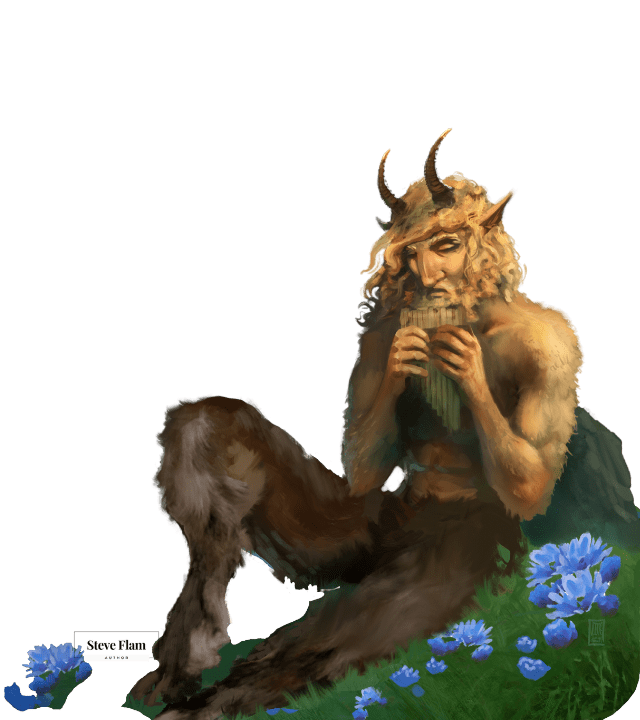
Read Steve Flam's Original Short Stories
- Breakfast With Santa
- Marty Go Lucky
- Augie
- Cinco De Mayo
Herbal Tea
- Hula Hooping in America
- Gummed Up
Santas Wanted
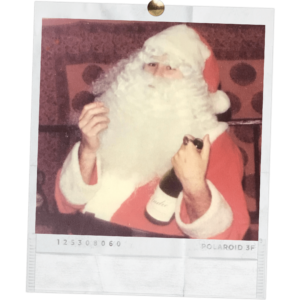
When I saw the ad in the LA Times, I knew this was something I’d always wanted to do, like going to Europe or swimming with the dolphins. I hadn’t known ‘til that instant, but it hit me hard.
The next day, I drove to the Santa interview. There was quite a crowd of drunken derelicts and your older retired gentlemen trying to make ends meet. A few looked like Santa. I was clean cut, twenty-four and stood out like a bright bulb next to dim candles.
Once I satisfied the initial background check, the gray-haired interviewer asked: “Why in the world do you want to be a Santa?”
“Well, I used to go to acting school, and never got it out of my system.”
She asked if I was a drunk?
“Nope.”
Asked if I did drugs?
“Nope.”
Asked if I liked kids?
“Of course, I like them! I’m still a kid myself.”
She said, “You know this is a full-time job for two weeks? What are you going to tell your other job?”
“I’m going to tell them I want to be a Santa!”
I got the job at Montgomery Ward in Compton. The former Santa had been arrested for on-the-job stealing and they needed someone at once.
Now came the hard part. I had to explain to my boss at Periodical Publishers I’d found another job for two weeks.
He was incredulous. “You’re quitting me to be a Santa! How much does a Santa make: minimum wage, three fifty an hour? You’re quitting a good paying job for that!”
“Mike, it’s not the money; I just wanta be a Santa. After Christmas, if it’s okay, I’ll come back to work.”
He agreed, reluctantly, but wasn’t happy.
The Santa costume was top quality, not like those Salvation Army outfits. This one had a full white beard with hair that looked real. And the red suit and hat were first class, with a leather belt and boots. The only thing I supplied was a pillow. You put on an outfit like that it transformed you.
Montgomery Ward placed me on a throne near the toy department. There was no cost to sit on Santa’s lap, but they did charge a fee for a photo and toy from Santa’s workshop. The toys were pure crap with a fancy wrapper and ribbon to fool you. Tell you the truth, I was embarrassed. Some of the children would eagerly tear open the wrapper and moan with disappointment, “Oh no, Mommy, look what that cheap Santa gave me.”
I wanted to go into the toy department and swap for the good stuff. The store was making me look bad! I wanted to set things right, but the detectives were watching on account of the larcenist Santa who’d just been busted.
Young children would gaze at me with awe and adulation—to them I was up there with God. Some of the little girls would cover me with kisses. Others would ask to yank my beard. “Are you a pretend Santa? Is that beard just fake? Let me pull it.” There were the inquisitive children with acute power of reason. “Hey, Mr. Claus, are you the fo-real Santa?”
“Of course, I am! The one and only.”
“How come everywhere I go I see other Santas? If you the fo-real Santa, who are those other guys?”
“They work for me. I’m the only real one.”
Some of the kids would ask about the Santas who worked outdoors, who rang bells and who’s beards looked like dirty cotton.
“Stay away from them, those are the bad Santas.”
Then there were the mothers. The hot mommies with nylons and high heels who knew they were babes—they liked to have fun. They’d ask to sit on my lap. Some would say, “I wonder what you look like under that beard? You look young. Maybe we can go out for a drink sometime?”
Other mommies would ask, “What happened to that last Santa, he always stunk like Muscatel and stale cigarettes. Is he in jail?”
Another said, “Last year we had a black Santa. We need to get one of those again! It goes with the neighborhood.
I wanted to say, “Ma’am, I’m a Jewish Santa, isn’t that the next best thing?”
For lunch I had my own changing area on the second floor. Next door was the counting room with a glass door. I used to watch three nerdy accountants set the cash on a table and wrap it in bundles. Montgomery Ward made hundreds of thousands in 1974! It was a time before credit cards took over, before debit cards, and when checks were rarely used, everyone paid in good old American cash. I used to have fantasies about that money. I would write movies in my head called The Santa Stick-Up.
During my two weeks of Santa work, the store handed out fliers: Enjoy a Breakfast with Santa! Five hundred tickets were sold! The management said they’d never had a turnout like this. I was thinking bonus, but never got one. There were prizes: twenty-five-dollar gift certificates and store coupons. The breakfast itself was nothing special: French fries and chicken tenders, Kool Aid, a cake and ice cream. What they called a healthy meal to build strong bones and sound minds.
I walked into the breakfast room. It was like being on a grand stage. Five hundred pairs of eyes fell upon me. Five hundred hopes and dreams with energy ready to burst. I took a deep breath and bellowed in my loudest cheeriest Santa voice: “HO-HO-HO, MEEEEEERRRRRY CHRISTMAS BOYS AND GIRLS!!!!”
Children shook free of their mothers and began to charge: Black kids, White, Chinese, Indian, and Mexican. It was a stampede! I stood my ground, opened my arms, and was soon awash on the ground with young bodies. Youngsters were kissing and hugging and imploring, stuffing lists in my hands. For an instant I was pure energy; it was the greatest single moment of my life, then, one by one, the children were gathered, and order was restored.
I picked up the lists and read them. Not only were they beseeching gifts, but there were love notes. “Dear Santa, I love my Mommy, I love my Daddy, I love Jesus, and I love Santa.”
I took my place on the dais and bounced children on my lap and struck deals and made promises I couldn’t keep. I forgot I was just a twenty-four-year-old kid making three-fifty an hour. I was Old Saint Nick, the most important person in the whole world.
Marty Go Lucky
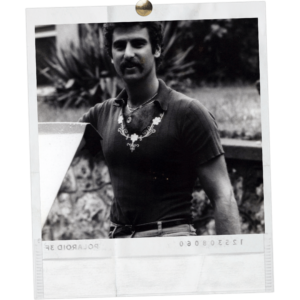
Marty was a backgammon hustler whose main gig was a daily house game consisting of four rich old ladies. The women were in their sixties while Marty was a youthful forty-eight. As far as skill, Marty was light years better than the old gals. He’d charm and flatter them on their gamesmanship, and at the end of the session he’d have his two hundred.
The old ladies would say, as they wrote out their checks, “Marty you are so lucky!” He’d agree and insist they’d get him next time, then off he’d drive straight to his dealer and score an 8-ball so he could party with his cocaine whore and blow every cent.
Marty took me under his backgammon wing. I was an up-and-coming thirty-five-year-old backgammon hustler. We partnered in two doubles tournaments and won them both! Everyone said how lucky we were.
Eventually his love for cocaine outweighed his passion for backgammon. Every dollar went for coke. Now he was disheveled, smelled, and was ruder than shrewd. Always in a rush to win the money and get out of the old lady’s beautiful homes so he could smoke base. It didn’t take long before the women stopped inviting him. Who needs such a creep!
He dropped out of the backgammon scene! I wouldn’t see him for years at a time. Whenever I’d bump into him, he looked haggard and wasted. He’d tell me his stories, how he was managing a motel or running a peep show. Every job had a scam attached to it. He was regularly smoking coke, free basing or using crack.
After a while Marty made a hi-end connection. Here was the deal: he’d mule kilos of cocaine from Fort Lauderdale to Los Angeles using major airlines. His pay was twenty-five hundred a delivery. It was 1989, pre-terrorist days, and security was lax. The first few trips went fine. Marty was rolling in dough, partying like a rock star. On the third delivery with bags of coke taped to both legs, bags to his stomach, and bags around his back, the Los Angeles DEA swooped down like a pack of wolves on an old billy-goat. Two big fellows gripped each of his skinny elbows. One guy flashed a badge. “We got a tip, sir. We believe you’re transporting an illegal substance. Mind if we check your bag?”
Numb with fear, Marty used his only weapon: Outrage. “Why the fuq are you bothering me??? There’s been a death in my family. Sheesh!” His yellow stained teeth were chattering; his boney knees quaking; his eyeballs bulged from the gram he’d snorted in the plane bathroom. He was in a difficult spot.
“I’m sorry, sir, this won’t take long.” The two kilos of cocaine taped around his body began to itch; he didn’t dare scratch. In desperation, he prayed: Please, Jesus, if you get me out of this one, I swear I’ll never do it again.
“Go ahead and check my bag,” offered Marty, groping for a Hail Marty. “I’ve got nothing to hide.”
The agents smiled like, what a fool and clicked open his suitcase. There was just a couple of rumpled shirts, a pair of jeans, socks and underwear. Nothing was folded. “Where’s all the damn clothes?” They burst out.
Marty seeing a glimmer of doubt, said, “I travel light.” The agents looked around for someone else to bust. The tip was bogus, they had the wrong guy! They rushed off. Marty made his last delivery and pocketed his twenty-five hundred. After that, he got out of the transport business, kept his deal with the big guy upstairs.
Every now and then I’ll see him. He’s always charged and hopping on his toes. His teeth—what’s left of them—are a greenish brown. His eyes bulging and his skin profusely perspiring. “What’s going on, Marty?”
“Ah, you know, same old, same old. Still working as a clerk in the motel. Still smoking whenever I get it.”
“You’re getting too old for that shit.”
“Aww, it keeps me young. Hey, Steve, I won a Harley at the Seminole Casino raffle.
“No kidding.”
“Yeah, one winner out of a million entries. Imagine. I sold it, though, right at the casino. Got a nice price, too.”
I shook his damp hand. He was in a hurry to be off and get high. Our lives had crossed paths and gone in different directions. We’d been buddies but now he smoked with the devil and danced with crack whores, while I preferred a glass of carrot juice and a bowl of quinoa and vegetables. I never saw him again.
Augie

On the conclusion of World War II, my father, Benjamin Flomenbaum, had an inspiration: convert the family mattress business, which formerly made only adult mattresses, into a baby mattress company! It was the single greatest idea of his life, for the soldiers returning from war were eager to start families, and the Colgate Mattress Company became a household word in the industry.
In 1964, the highest-paid workers in Dad’s factory were the sewing machine operators who stitched together the baby mattresses. Instead of the stingy hourly rate, somewhere around a $1.15, the sewing machine operators were paid piecemeal according to the skill and quality of their work. These hard-working laborers made a decent wage. They were the stock and trade of the industry.
One thirtyish employee named Augie, thin and wiry with freckles and red hair, worked like a demon. He had a family of ten in the Bronx and he needed to support his hungry brood.
Augie arrived early and left late. He toiled with head hunched to the bobbin at twice the speed of anyone else. His paychecks were grandiose, and my father was happy to pay, for Augie’s work was impeccable. Never once did a mattress sewed by Augie fray apart.
But Augie had a bit of the devil in him. While he sewed mattress after mattress for a hundred hours a week, his mind would wander: Wouldn’t it be interesting if I tied down twenty or even thirty box springs with a rope, tied them tight and compressed them and when they were all fastened together, what a force I could assemble! It would be like a weapon from the crusades! This fantasy of making a fantastic sling out of box springs, occupied Augie’s mind. It kept him sane and after a time, the idea could not be contained.
In the summer of ‘65, I began employment at the Colgate Mattress Company for one dollar and twenty-five cents an hour, minimum wage. I was fourteen, loading baby mattresses into the trucks for delivery.
One morning, as Dad and I arrived for the day, we were greeted by the frantic faces of the bookkeeper and salesman. Gray haired Gladys with a trill in her voice said: “Augie did it again, boss! You better go in the factory and have yourself a look.”
I followed my father as he stormed into the factory; his face beet red; his mouth twisted with fury. We walked into the open area where the sewing machine operators labored. It resembled a war zone. There were box springs everywhere: imbedded in the walls, hanging from light fixtures, broken glass, turned over tables and machines: BOX SPRINGS! BOX SPRINGS! BOX SPRINGS! The damage was incalculable.
My father seethed. “Where is that goddamn crazy Puerto Rican? Where is he!!!
Lou, one of the sewing machine operators said, “He ain’t come in yet, boss.”
My father hollered, “If he calls, tell him he’s fired. Tell him he better not show his face here for I’ll put his destructive ass in jail. You tell that sonovabitch he’s going to jail this time! That goddamn sonovabitch!”
For the next two weeks, Augie hid at home, but as the damages were repaired, my father began to miss the zealous stitching of his best worker. Production had been cut in half! My father was beside himself. He was in a bind; it would kill him to ask Augie back to work.
One day Augie returned dressed in tie and jacket with his wife and three little ones by his side. The red-haired freckled Puerto Rican pleaded for his job.
My father was ready to forgive at once but for form-sake he made Augie promise never to lose his sanity again. It was a deal! Hands were shook, hugs exchanged.
A few weeks later Augie would get a raise. A year later, Augie would make another sling, this one grander than the last. It happened every year like clockwork. It was the cost of doing business.
Cinco De Mayo
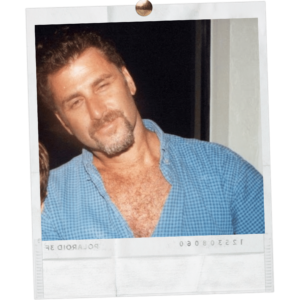
I was returning from my daily dip in the ocean when I first met Linda in the Hollywood Beach municipal parking lot. She was two cars away, rummaging for quarters. She glanced over, “Hey, you have change for a dollar?”
“You need time on the meter?”
“Yeah.”
I asked if she was a cop?
“No.”
I inserted a flattened plastic straw into the meter slot, shoved it in until the gears caught, then twisted the dial ‘til the meter registered 6 hours.
She was smiling, “Can you teach me that?”
“Sure, it’s a surfer’s trick.” I accompanied her toward the beach, took her phone number and subsequently we started dating.
Linda had natural curly hair and a tennis body, affectionate and full of fun, I felt an instant bond. I was a hardcore gambler on the edge of solvency so we hung-out, shared meals and had amazing sex. For recreation, I would take her to the dog track.
I considered Linda my girlfriend and would see her two or three times a week. She had a vulnerable side, confessing her lifelong affliction: she was born with a preponderance of body hair. Linda had spent years going for electrolysis. “Imagine how the grade school kids made fun of me, Steven? Could you ever really love me knowing I was born with the ape gene?”
“Who cares, you’ve had it removed. You are so beautiful, Linda.”
One evening I popped over unexpectedly. That’s the way it was back in 1986. No cell phones, so you just popped over.
She was flushed with guilt, and said, “A guy from work is stopping by to drop off some paperwork.”
“Ok.”
“Here’s the thing, Steven, I’m ashamed to tell you. I had sex with him yesterday.”
“What???”
“He’s married, but I’ve had a crush on him since I started with the company. The other day, it just happened, we fucked. It wasn’t good. We both agreed it was a mistake.”
I couldn’t believe what I was hearing. I was decimated inside, but outside I showed a calm facade.
The doorbell rang. An out of shape redhead with eczema stood there, smirking. He said hello but his face said, hey, I just fucked your girl. He dropped off a briefcase and left.
Afterward, Linda and I drank a bottle of Chardonnay, ending in the bedroom. She tried to make amends, apologized with kisses, but I couldn’t get over how she’d cheated. I wasn’t cheating on her. Before I left, she said, “Cinco de Mayo is in ten days. That’s my birthday! Let’s go dancing in South Beach. I’ll pay. Will you mark the day on your calendar, Steven?”
“Sure.”
I couldn’t forgive her for cheating. For the next week, I didn’t return her calls. Her messages were filled with panic. “Steven, I need to see you!” Finally, she ran me down at the dog track, asked why I hadn’t returned her calls? I gave her a half lie, told her I’d hit the mother of all losing streaks, which I had.
“Steven, I can help you out. Let me lend you $500. Pay me back when you start winning.” Even though I knew it was over, I was desperate. I took the five-hundred-dollar check, folded it once, and stuffed it in my wallet.
“Don’t forget, Cinco de Mayo, this Saturday. Pick me up.”
I never showed. I meant to pay her back, though. I was honorable, but the losing streak wouldn’t quit. It gripped me by the balls and squeezed. I was a two-bit hustler getting my ass kicked daily at The Hallandale Bridge Club. Then one day, a fellow hustler, moving to Philadelphia, gave me three backgammon books as a parting gift. “I won’t be needing these anymore, Steve. I’ve got a real job now as an engineer. These books will transform your game.”
The books were The Holy Grail of backgammon, written by world champions Joe Dwek, Bill Roberti and the guru of backgammon himself: Paul Magriel.
I studied night and day for a week. Didn’t play backgammon or gamble once during that time. I learned to count pips, play backgames and the subtlety of offering a timely cube. On my return to the bridge club, my skill level soared. I began winning voluminous sums regularly. The old ladies, remembering how poorly I once played, kept inviting me to their homes for backgammon sessions. On occasion, my older female hosts suggested we settle in the bedroom. I deferred for cash.
The next year I bought a brand-new Toyota truck and traveled the summer to Vermont. On the way to the Vermont tournament, I would play at card clubs in Manhattan and Mamaroneck.
Two years passed. I was a free-spirited, self-employed backgammon hustler. I worked when the opportunity struck, and when I lost, I always paid. Still, I had one stain on my character—I owed Linda five hundred dollars. I needed to pay her back! I called her on Cinco de Mayo. The phone number had been disconnected. I drove to her apartment; she didn’t live there anymore! I was torn with angst; maybe I’d been too quick to condemn? How could I let a woman of such quality disappear from my life? I missed her. I was ready to forgive. People were just people, right? We all had our weaknesses. Who was I to be so moralistic? I sat down on her front step full of regret. In my mind, I could see her walking toward me. Her smile—a beam of bright radiance; her laugh—the soft tinkling of a wind chime; her athletic body, fine contoured breasts and muscular legs filled me with yearning. I held up a cupcake with a candle and sang: “Happy Birthday Linda! Happy Birthday My Sweetheart. I’m so sorry I left.” I sang out loud and when I was done, the candle extinguished in a gust of reality and the image vanished. I stood up and walked back to my truck. I had a game to go to.
Herbal Tea
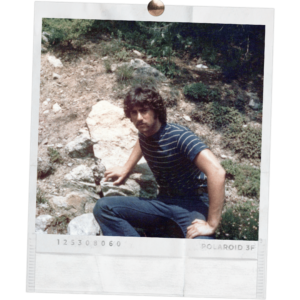
Published by Akashic Books in 2014
Harry was a twenty-two-year-old junkie who made his living pedaling marijuana to sailors on Telegraph Avenue. He would buy lid bags of Mexican for ten dollars apiece and resell them for twenty. Some nights he would sell five.
After a while, Harry figured he was taking too much risk for such a small bit of money.
He decided to cut his costs and fill the Baggies with tea instead of pot. He bought the tea from an Indian grocery store for forty cents an ounce.
In October of ’73, Harry and I lived in the same rooming house in Berkeley and were passing friends. He explained to me the genius behind his new business scheme. Not only did he double his profits, but if the cops snagged him, the charges could not stick for selling tea.
I asked, “Won’t the sailors notice?”
“Are you kidding? Those dumbasses are repeat customers!”
Sometimes we’d smoke a joint together, but he never offered me smack. He said he had a conscience.
He had a weird view of life. He asked me, “Who do you think are the best salesmen in the world?”
“I don’t know.”
“Junkies!” he exclaimed with pride. “A junkie could sell you the spit off his lips. Imagine, if the big corporations ever harnessed that power, they could rule the planet.”
I thought it over. “I don’t think so, Harry. Eventually a junkie would just rip off the company and go get high.”
Harry had a good laugh. “I guess you’re right.” And he strolled off casually to his room. After a while I heard Freddie Hubbard blowing the horn from Harry’s tape player and I knew Harry had just shot up.
For a few months the tea business was booming. The Navy had landed. Harry would see me in the hallway, say hi and go into his room. He was a loner and I never saw him with a single friend. He had a nice look too: clean-shaven with longish brown hair, quality shoes, and a mahogany leather jacket. He resonated coolness.
One night Harry knocked on my door and asked for help. He’d been manhandled by a couple of pissed-off sailors. His face was bruised and swollen. His eyes were shut like a battered prizefighter; his lips were split and he was spitting blood into a towel. But the worst was his nose. It was pushed all the way to one side.
I said, “Harry, you need to go to a hospital.”
He said, “Fuck it, I’d end up getting busted. You think I need that shit! I want you to push my nose back, okay?”
“Are you nuts!”
He said use the heel of your palm and push as hard as you can.
I did the best I could and he grimaced; then examined himself in the mirror and had me shove some more. After that he asked me to get ice. I went to the kitchen freezer and fetched all the ice trays; when I got back to his room, he was shooting up. Beside him was a spoon with a cotton ball and a lighter. He had a belt wrapped around his arm and gripped in his teeth. He shot it smooth, and the hard facial tension relaxed into a pool of tranquility.
Three days later, when I came to visit, Harry was shivering with a blanket draped over his shoulders. He told me he was broke and kicking cold turkey. He didn’t have the heart to ever scam sailors again. God had spoken to him.
He was plied with Valium and Early Times. He had busted a chair, punched holes in the wall, and his rage was a continuous rant against the universe. His bruised face was beet-red with withdrawal sickness. Balls of sweat were beading on his forehead like eruptions. When he wasn’t running to the bathroom, he was puking in a bucket.
He kicked in four days. Other junkies told me it wasn’t possible, that Harry must have only had a chippie habit. I couldn’t say.
One month later, his bruises were healed. He was his old self with a freshly crooked nose. He went back to selling herbal tea to sailors. He said, “What the hell, it’s what I do.” That night when he squeezed in the needle, before his eyes rolled back and he slipped into a nod, he whispered in a breathless rapture, “It’s like being a virgin all over again.
Hula Hooping in America
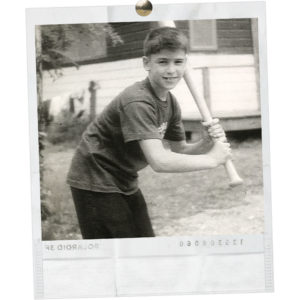
Published by Looking Back Magazine in 2012
In 1958, when I was seven years old, the Hula-Hoop craze hit America. There’d been other crazes like the Frisbee and the Yo-Yo, but the Hula-Hoop was the Big Daddy of them all. For one thing, adults couldn’t do it. They were spastic, after just a few twirls, it would drop to the ground. The fad caught the imagination of America, consuming every kid in its path with a mad, wanton desire to Hula-Hoop.
I had a natural talent, and I carried my hoop with me everywhere. One day, as my older sister played monopoly with three other children, I hovered over the game, twirling away. I gyrated and spun the hoop around and around, counting each rotation. After nearly half an hour, as I approached the rarified air of One thousand, I became confused, somehow mixing up ten hundreds with the words ten thousand and I burst out with childish triumph: “Ten Thousand!”
My older sister, Tina, jumped up from the game and knocked the hoop to the ground. “Are you crazy, Steven? You want to go to the hospital!” My sister was not an athlete and did not understand the significance of records and how everyone strove for one. She was more into being a mother, even at eleven.
I was angry. “What have you done! Why did you do that?”
Now the game suddenly halted. One of the boys asked suspiciously: “Did you really do ten thousand?”
“Yes!” I stated with conviction. In my mind, however, I was furiously recalculating. Had I meant to say ten hundred? Had I made a mistake?
By now the older kids were huddling amongst themselves. Albert, the grand pooh-bah of the block—who would later become a psychoanalyst—reasoned out loud: they’d had been playing Monopoly for two hours and Tina’s little brother, Steven, had been twirling the entire time? Did he do ten thousand? Of course, he did! It was beyond reproach.
One kid shot off to carry the news around the neighborhood: Tina’s little brother was the Babe Ruth of hula hooping. Ten thousand! Amazing! It was a new record that could never be beaten!
Of course, in another moment, I determined I’d blurted out the wrong figure, but by then it was too late. I was already a hero. I had gone from obscurity to fame in a minute. And it was wonderful. Did I feel the sting of conscience? Yes, but I choked down my guilt.
During the next week, kids around the neighborhood would approach, patting me on the back. No one questioned the validity of my feat; I had confirmed witnesses. I even began to believe it myself. I was the best hula-hooper in the world. Surely, I could have done ten thousand, if my meddling sister hadn’t knocked the hoop down. Now I walked around with status. No one came close to beating the record, and how could they, it was pure make-believe.
In the spirit of Hula-Hoop mania, a contest was announced at Gedney Field to determine the 1958 Hula-Hoop champion. The winner was to receive a brand-new Schwinn bicycle and have their picture in the newspaper, The Reporter Dispatch. I was the hope of Beverly Road. All eyes were on me.
On the day of the contest, I walked up to Gedney Field and stood awed: There were five hundred boys and girls of all ages and backgrounds. A whistle blew and the contest began. These kids were good; there were no slouches. The judges became impatient and tried to speed things up by making us do tricks—down to the knees and up, turn about, hop. Hoops began to fall one after the other.
A nearby kid accidentally bumped into mine and down went my hoop. “Oh no, that wasn’t fair! Hey, did you see that?” But the monitors were escorting the fallen hoopers away. I was out of the contest. I had lost. My reign was over.
I trudged home in defeat. After that no one ever asked me about my record. It was soon forgotten, and I slipped back into anonymity. The Hula-Hoop craze died down, almost as fast as it began. Hula-Hoops were piled in the garage and never touched again.
Gummed Up
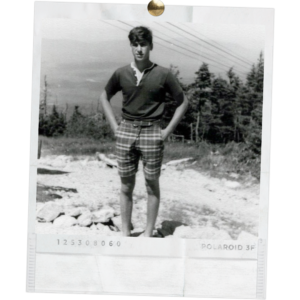
Published by Hippocampus Magazine in 2015
We were scrounging for bottles, Keller and I, through the debris of rusted cans, shattered glass, and old tires. The bottles we sought had been thrown off a bridge from Gedney Way into the gully below. It was 1965, and the soda bottles were greenish and made of thick glass. We managed to fill up two shopping bags at two cents apiece.
We climbed up to the street and headed to Gristedes. Right in front of the supermarket, we noticed eight 32-ounce Coke bottles just sitting there.
I said to Keller, “You think some rich person might have left these, not bothering with the deposit?”
Keller said, “Man, it sure looks that way. Damn.” We added the eight bottles to our shopping bags. They would fetch a nickel apiece.
We strode up to the cashier and set the brown bags on the counter.
“Where did you boys get all these bottles?” the gray haired women asked with distaste. Some of the slimy bottles had gum in them, others cigarette stubs.
“We found them,” I answered.
“Well, next time, please wash them. Today’s redemption day, so I need to hose them down and set them in the front of the store for pickup.”
We received two dollars and twenty-two cents, split it evenly, and rushed off to Sam’s Deli. I bought a huge sour pickle from a barrel and an Orange Crush. Keller purchased a Hostess Twinkie and a Mountain Dew. We sat on the front stoop of the store, like a picnic, watching the cars glide by. A ‘57 Chevy with its top down passed. What a beautiful spring day!
We walked down to the Gedney Way Pharmacy to spend the rest of our loot. Keller bought five packs of Tops baseball cards and I purchased an Archie and a Superman comic at twelve cents each. Then we meandered over to the magazine section and sneaked a peek at the new Penthouse. All the naked women had great wooly patches of black hair and big boobs. After a time the store manager shooed us away. “This is no library; you kids git out of here.”
We took the shortcut through the woods, passed the old coal tower, and cut through the Binger backyard to our block: Beverly Road. We sat down on the fresh mowed grass of my front yard and surveyed our stuff. Keller jammed a stick of bubble gum in his mouth and shuffled through his first pack of baseball cards.
“Not another Milt Pappas,” he grumbled. “Hey Flam, now that you’re fourteen, what’s a matter with you, you’re too old to buy baseball cards?”
“I don’t have to since I taught that new kid on Albemarle Road, Kenny Lipski, how to flip cards. I showed him how to play knocking down leaners and topsies and won every card he had, a whole shoebox full of them. I’m waiting for his dad to buy him another case, then we’re going to play again. Lipski wants to win his cards back.”
Keller said, “Why don’t you introduce me? I want to play him.” He handed me a stick of gum, and I slipped it in my mouth. It was full-bodied pink bubble gum, rich in sugar and guaranteed to rot your teeth. In those days we all had a mouth full of black mercury fillings. Dentists would swear they were stronger than teeth and would last a lifetime. Those fillings lasted me forty years until they loosened up and took the whole tooth with ’em. But hell, that was forty years of good use, a lifetime to a kid back then.
Keller was looking through his fourth pack of disappointing cards when we noticed my next door neighbor, six-year-old Janet Sosinski, tiptoeing up on us. She’d venture as close as she could, then run off screaming with fright.
“What the hell is wrong with that little girl?” Keller asked, pressing another stick of gum in his mouth and offering me a second piece to renew the flavor.
“She’s just the scaredest kid I ever seen. She’s scared of everything.”
Next time she approached, Keller jumped up and started making horrific faces. Janet shot off like a rabbit that wandered into a wolf den. Keller broke out laughing, thought it was the funniest thing. It got me laughing, too.
On Keller’s fifth pack he found an Orlando Cepeda and a Juan Marichal. What a find! Keller hooted for joy. He was a Giants fan, and you couldn’t ask for better.
Janet Sosinski peeped out her door again, and Keller leaped up and made some faces, yelled, “I’m going to get you!” Janet burst out crying and slammed the door of her house. Keller laughed so hard tears were edging out of his eyes. I guess I thought it was pretty funny, too.
I told him I was going to get in trouble if he kept it up. He said, “Oh man, that is so much fun.”
After a bit we saw Denise Fein strolling down the street with her tan poodle on a leash. Denise was the same age as Keller, thirteen. She was freckly and pudgy with a thick mane of frizzy chestnut hair, but she had one prominent feature that demanded respect: she was stacked. She had the biggest tits on the block. Denise stopped in front of us with her poodle tugging her arm. She turned her head sideways, and I knew she was sweet on both of us.
She said, “My parents went away with my brother for the day and left me all by myself. You guys want to come over and listen to my records?”
I left the comic books on our front stoop for my sisters and we took off side by side with Denise. Inside her basement, Denise put on a stack of 45s on the record player: Smokey Robinson, the Shirelles, the Supremes, and the boys from Liverpool, the Beatles. We sat on the couch with Denise between us.
No one made a move until finally Keller said, “I always wondered if those big tits of yours are real. You know, it’s a fact that Robin Feldbour stuffs her bra with tissue paper.”
“Oh, stop that. Mine are real, and you know they’re real, Steve Keller!”
On that Keller reached up boldly and palmed one just to be sure. He had a small strong hand with a touch of hair on the back. “Oh, damn me, they are real.” Denise blushed a full red but she didn’t nudge his hand away. If anything, she seemed to be enjoying the contact. Keller said, “Flam, these are the genuine article. Feel one.”
I reached over and gave the other one a gentle squeeze and confirmed Keller’s findings. “Damn, you’re right.” Denise was proud and seemed to be enjoying the attention. “The Tracks of My Tears” was playing on the victrola.
Next thing you know, Keller was kissing her from the front and fiddling with her right breast while I was reaching over her back, kneading the other one. I was in fondle heaven: it was my first experience at king-size. Denise was just thirteen but she was blossomed and bigger than most full-grown women. I was getting excited, panting, and saliva was leaking out of my mouth when, suddenly, my gum popped out and landed in the midst of her thick hair, like an egg in a nest.
I didn’t want to let go of her breast—that was asking too much—so I tried to retrieve the gum with my other hand. Just then, Denise shifted and the gum intermingled with some frizzy strands. I was alarmed; now every time I attempted to extricate the sticky pink gum, it would get more entangled.
Keller came up for air with an impish grin but he saw something was amiss by the look on my face and he followed my eyes to the glob. “Should we tell her?” I mouthed. He shook his head vehemently, and his eyes turned into pinpoints of determination. He motioned me to make room and let him have a go. With a dexterous touch, he had his fingers on the gum when Denise shifted again so the gum and the hair became one like a hairball. You never saw such a mess.
With our hands now away from her heaving breasts, Denise became suspicious. She looked up into my worried eyes and navigated where they were fixed, then she reached for the top of her head and felt the gunk.
“What have you two done?” she shrieked.
I admit I was relieved that Keller was included on the blame.
Keller said, “It was an accident. These kinds of things happen.”
She ran into the bathroom and screamed, “Oh, my God!” Then she let loose with an explosion of profanities, threatening to kill us both. We rushed out the basement door.
Shuffling down Beverly Road, I asked Keller, “Was she a good kisser?”
“I don’t know, I couldn’t get past the damn braces; she did whisper to get rid of you though.”
“Noooooo, she said that?”
“Yeah,” Keller said. “Maybe in a week, when she gets that gum out I’ll come over to listen to some more records.”
